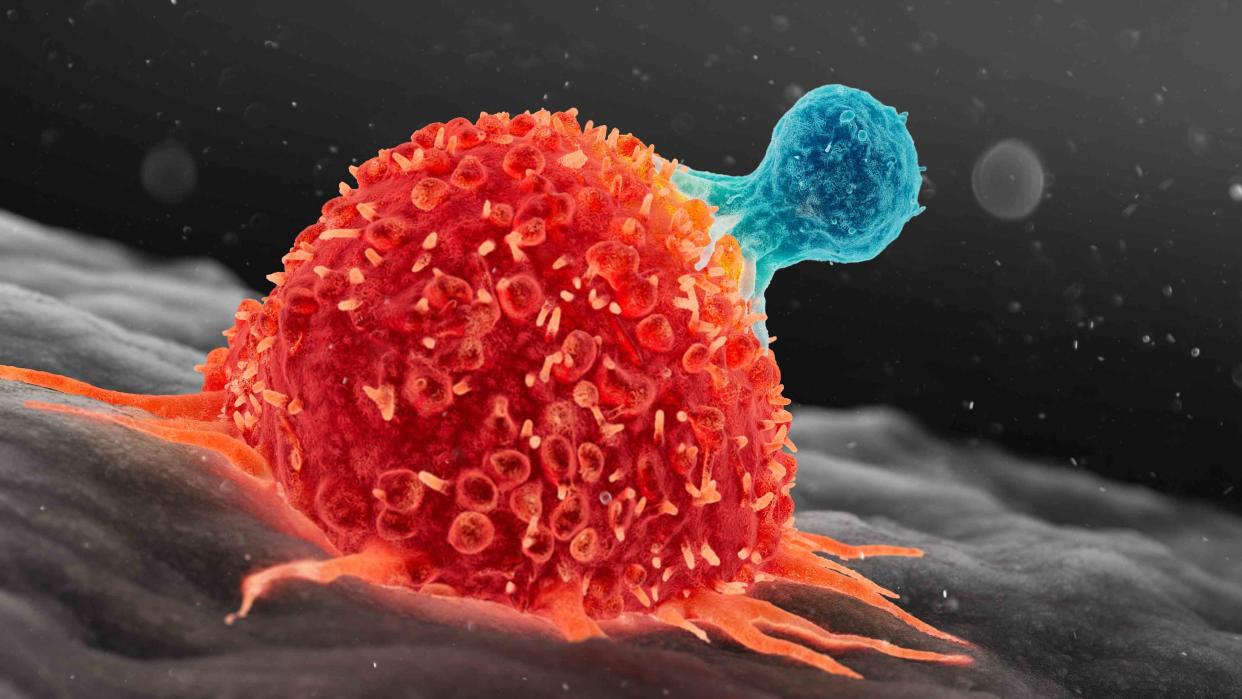Which Autoimmune Diseases Could CAR-T Therapy Treat?

Thom Leach / Science Photo Library / Getty Images
Fact checked by Nick Blackmer
Key Takeaways
CAR-T therapy is a cancer treatment that engineers the body’s own cells to kill cancer tumors.
This treatment is being tested against some autoimmune diseases.
In a recent study, CAR-T therapy had the most success with lupus patients.
Autoimmune diseases are notoriously difficult to manage, with patients often facing periods of remission and relapses. While there are treatments to help manage symptoms of autoimmune diseases, there is no cure—but that may be coming.
New research suggests that a form of specialized treatment used for some cancer patients shows promise as a potential cure for autoimmune disease. It’s called chimeric antigen receptor T-cell treatment (CAR-T), and it uses T cells, which are white blood cells that are an important part of the immune system.
Experts say the findings show promise for CAR-T therapy beyond cancer treatment.
Related: CAR-T Therapy May Treat Conditions Other Than Blood Cancers, Research Shows
3 Autoimmune Diseases Showed Improvement
The study, which was published in the New England Journal of Medicine, followed 15 patients with autoimmune diseases as they underwent CAR-T therapy. Eight of the patients had lupus, four had scleroderma, and three had a rare muscle disease called idiopathic inflammatory myositis.
The study participants received a single infusion of CAR-T cells after “preconditioning” with chemotherapy drugs fludarabine and cyclophosphamide. The researchers found that all of the patients responded to the treatment, but some had better results than others.
The researchers found that autoimmune diseases were either eliminated or had reduced symptoms or disease biomarkers after that one CAR-T therapy. Patients with lupus did not relapse after having the treatment during the two-year follow-up period. Patients with scleroderma and those with myositis had a reduction in symptoms during the follow-up period.
“CAR T-cell transfer appeared to be feasible, safe, and efficacious in three different autoimmune diseases, providing [a] rationale for further controlled clinical trials,” the researchers wrote.
How CAR-T Therapy Works
CAR-T therapy revolves around T cells, which are a type of white blood cell that develops from stem cells in the bone marrow. T cells help protect the body from infection and may help fight cancer.
“T cells are sort of the quarterback of your immune system,” Michael Jain, MD, PhD, ICE-T medical director in the Moffitt Cancer Center Department of Blood and Marrow Transplant and Cellular Immunotherapy, told Verywell.
CAR-T therapy takes a sample of a patient’s T cells and changes some genes in the cells to help them be better at finding proteins called antigens in cancer cells. The process uses a chimeric antigen receptor for the form of cancer a person has and adds it to the T cells. After the cells are ready, they’re put back into the patient’s body through an IV.
“CAR-T redirects our own T cells to recognize and kill tumor cells and is several-fold more potent than our native T cells,” Rashmi Khanal, MD, assistant professor in the Department of Bone Marrow Transplant and Cellular Therapies at Fox Chase Cancer Center, told Verywell.
But CAR-T therapy can cause side effects. One is cytokine release syndrome (CRS), which is a condition that happens when your immune system responds to infection or immunotherapy drugs more aggressively than it should.
CAR-T therapy can also cause neurologic effects like severe confusion, seizure-like activity, and impaired speech. Other less severe side effects can include fever, chills, vomiting, dizziness, and agitation.
Related: How CAR T-Cell Therapy 'Cured' 2 Cancer Patients
Why CAR-T Therapy May Help With Autoimmune Disease
“Under typical circumstances, our immune cells have the ability to differentiate and recognize what is your own cells and what is foreign cells,” Wael Harb, MD, a board-certified hematologist and medical oncologist at MemorialCare Cancer Institute at Orange Coast and Saddleback Medical Centers, told Verywell. “When you get a virus or bacteria, the body recognizes that this is not my own cells and attacks it.”
With autoimmune disease, your immune cells mistakenly attack your own body.
“The idea is that we can use CAR-T cells to attack the immune cells that are confused and eliminate them,” Harb said.
With that, the treatment may help “reset” immunity, Khanal said.
In this particular study, CAR-T therapy had the most success with lupus patients. However, it’s also being studied for use against graft versus host disease, cardiac fibrosis, and fungal pulmonary aspiration.
CAR-T May Be Difficult to Implement for Autoimmune Diseases
Harb called the use of CAR-T therapy for autoimmune diseases “fascinating, because you’re able to take your own cells and reengineer them.” But he also said that the process is complex and expensive. “You have to give patients some sort of chemotherapy before you infuse it, and this can cost about $500,000 for a treatment,” he said.
Jain said that there are important logistical elements—in addition to more research—that need to be overcome before CAR-T therapy can become a widespread treatment for people with autoimmune disease.
“This is a very cumbersome treatment to give, he said. “Patients have to stay in the hospital for a period of time and it’s hard to scale.”
Autoimmune diseases are also more common than the types of cancer that CAR-T therapy is currently used to treat.
“You have to figure out how to take this process—which is very boutique—and expand it out to a large population,” Jain said. “It may be that only those who have more severe autoimmune diseases could get this.”
What This Means For You
CAR-T therapy is a form of cancer treatment that is being explored to treat some autoimmune diseases. While CAR-T therapy is not currently FDA-approved to treat people with autoimmune diseases, there are clinical trials happening now.
Read the original article on Verywell Health.

